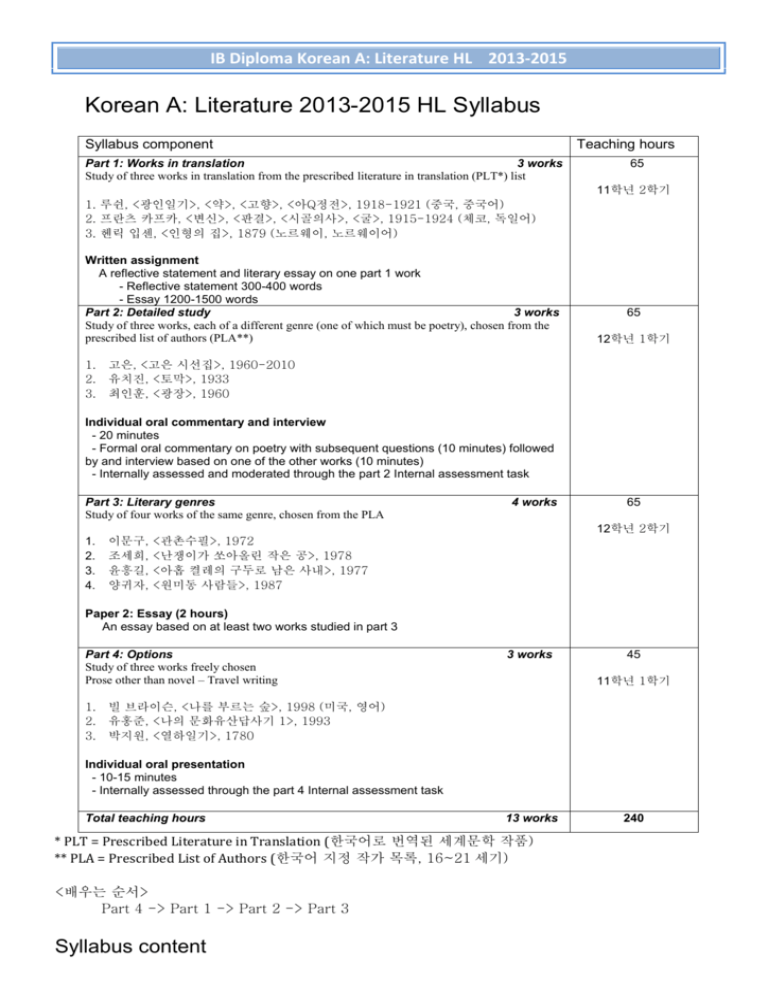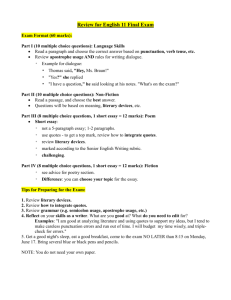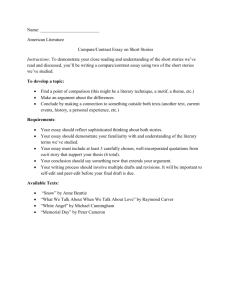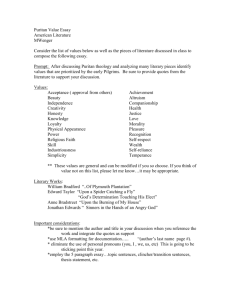Part 1 - IST Learning
advertisement

IB Diploma Korean A: Literature HL 2013-2015 Korean A: Literature 2013-2015 HL Syllabus Syllabus component Teaching hours Part 1: Works in translation 3 works Study of three works in translation from the prescribed literature in translation (PLT*) list 65 11학년 2학기 1. 루쉰, <광인일기>, <약>, <고향>, <아Q정전>, 1918-1921 (중국, 중국어) 2. 프란츠 카프카, <변신>, <판결>, <시골의사>, <굴>, 1915-1924 (체코, 독일어) 3. 헨릭 입센, <인형의 집>, 1879 (노르웨이, 노르웨이어) Written assignment A reflective statement and literary essay on one part 1 work - Reflective statement 300-400 words - Essay 1200-1500 words Part 2: Detailed study 3 works Study of three works, each of a different genre (one of which must be poetry), chosen from the prescribed list of authors (PLA**) 1. 2. 3. 65 12학년 1학기 고은, <고은 시선집>, 1960-2010 유치진, <토막>, 1933 최인훈, <광장>, 1960 Individual oral commentary and interview - 20 minutes - Formal oral commentary on poetry with subsequent questions (10 minutes) followed by and interview based on one of the other works (10 minutes) - Internally assessed and moderated through the part 2 Internal assessment task Part 3: Literary genres Study of four works of the same genre, chosen from the PLA 4 works 65 12학년 2학기 1. 2. 3. 4. 이문구, 조세희, 윤흥길, 양귀자, <관촌수필>, 1972 <난쟁이가 쏘아올린 작은 공>, 1978 <아홉 켤레의 구두로 남은 사내>, 1977 <원미동 사람들>, 1987 Paper 2: Essay (2 hours) An essay based on at least two works studied in part 3 Part 4: Options Study of three works freely chosen Prose other than novel – Travel writing 1. 2. 3. 3 works 45 11학년 1학기 빌 브라이슨, <나를 부르는 숲>, 1998 (미국, 영어) 유홍준, <나의 문화유산답사기 1>, 1993 박지원, <열하일기>, 1780 Individual oral presentation - 10-15 minutes - Internally assessed through the part 4 Internal assessment task Total teaching hours 13 works * PLT = Prescribed Literature in Translation (한국어로 번역된 세계문학 작품) ** PLA = Prescribed List of Authors (한국어 지정 작가 목록, 16~21 세기) <배우는 순서> Part 4 -> Part 1 -> Part 2 -> Part 3 Syllabus content 240 IB Diploma Korean A: Literature HL 2013-2015 Part 1: Works in translation (3 works, 65 hours) This part of the course is a literary study of works in translation, based on close reading of the works themselves. Through that study students are encouraged to appreciate different perspectives of people from other cultures and to consider the role that culture plays in making sense of literary works. In addition, this section aims to deepen the student’s understanding of works as being products of a time and place. Artistic, philosophical, sociological, historical and biographical considerations are some suggested areas of study to enhance understanding of the works. In this section, teachers should aim to develop the student’s ability to: • Understand the content of the work and the qualities of the work as literature • Recognise the role played by context and conventions in literary works • Respond independently to the works studied by connecting the individual and cultural experience of the reader with the text Part 2: Detailed study (3 works, 65 hours) At HL one of the genre must be poetry. In Part 2, the focus is on detailed analysis of a work, both in terms of content and technique. It is in this section that students study some of the most important works in the major genres of their respective Languages A. The detailed study is best achieved through approaches which ensure close reading and in-depth analysis of the significant elements of the works involved. In this section, teachers should aim to develop the student’s ability to: • Demonstrate appropriate analytical response to specific genres • Understand and make appropriate use of terms appropriate to literary study (for example, persona, point of view, metaphor and irony). • Show how particular effects are achieved through language use and analyse elements such as character, theme and setting • Engage with the details of works in order to develop a considered and informed response. Part 3: Literary genres (4 works, 65 hours) In Part 3, a group of works selected from the same literary genre is studied in depth. Each genre has recognisable techniques which we refer to as literary conventions and writers use these conventions, along with other literary features, in order to achieve particular artistic ends. The grouping of works by genre is intended to provide a framework for the comparative study of the selected works through an exploration of the literary conventions and features associated with that genre. In this section, teachers should aim to develop the student’s ability to: • Acquire a clear sense of the conventions of the selected genre • Understand the ways in which content is delivered through the conventions of the selected genre • Compare the similarities and differences between the chosen works Part 4: Options (3 works, 45 hours) This part of the programme is designed to give teachers an opportunity to include in their courses works which reflect their particular interest or in some cases which meet specific needs of their students. All works may be chosen freely and any combination of works may be used, either in the Language A or in translation. Following are four available options for studying this part of the syllabus. For all choices the assessment task is the same and students will be rewarded for their literary understanding as well as for an effective oral presentation. The intention in providing options is to enable teachers to freely choose their approach, in keeping IB Diploma Korean A: Literature HL 2013-2015 with the aims and objectives of the course, whilst offering suggestions for the types of choices that are suitable for literary study at this level. All options have learning and teaching aims in common. To assist in teaching specific units, additional aims are given for some options. In this section, teachers should aim to develop the student’s ability to meet the following learning outcomes: • Develop knowledge and understanding of the works studied • Present an individual, independent response to works studied • Develop powers of expression through oral presentation • Learn how to interest and hold the attention of an audience Option 1: School based choice This option provides teachers with the opportunity to choose the approach that best suits their own interests and backgrounds, as well as those of their students. The free choice option may also be dictated by circumstances that apply to specific regions or countries. Such circumstances may be a study of works in a particular genre or period or from particular countries to balance choices elsewhere in the programme, or a selection of texts which fulfill local or national requirements. Option 2: The Study of Prose other than Fiction leading to various forms of student writing This option will acquaint students with various forms of writing which fall outside the realm of such fictional forms as novels or short stories. ’Prose other than fiction’ may include travel writing, autobiography, letters, essays, speeches, or more contemporary experiments in “creative non-fiction.” The intent is to study such types in terms of both form and content. The further goal is a sufficient grasp of the techniques that will enable the students to develop their own explorations of these forms through personal writing. In this option students will develop the ability to: • To understand the conventions of prose other than fiction through writing • Develop detailed study of effective authorial choices in these forms • Extend the range of appropriate critical terminology for these forms • Explore the cultural contexts of the works studied • Practice and produce writing in these forms • To use a critique of their own writing as the basis for their oral presentation Option 3: New textualities This option provides an opportunity for students to study rapidly evolving text forms. Examples of such text forms are: graphic novels, hyper-text narratives, and fan fiction which blend media and defy easy categorisation. The following guidelines apply to the choice of such materials; all of the materials should be original texts, not adaptations of previous literary texts; all of the choices should have some evident aesthetic/intellectual merit. In this option students will develop the ability to: • Appreciate new textualities within a critical framework • Explore the relation of these forms to conventional written texts • Explore the relevance of these forms to the larger context of changing modes of literacy Option 4: Literature and film In this option the three works at the centre of the study must be printed works and the study will focus on adaptation, re-mediation, comparative narrative strategies, or skills of reading and viewing. That is, it is not a media study unit. IB Diploma Korean A: Literature HL 2013-2015 The study of the adaptation of a literary work into a movie increases understanding of how literature and film work in their respective ways. Students are exposed to moving images at every stage of their lives and this option can serve to merge their often uncritical experience of watching films and television inside or outside of the classroom, with a deeper reflection based on reading literature learned in school. In this option students will develop the ability to: • Develop the ability to compare films and their literary roots from a critical perspective • Analyse the reasons for the choices made in adapting a film from a literary work • Develop an understanding of how characters evolve in a specific time and space • Understand the use of symbolism and how it can be translated from one medium to another. • Understand and evaluate the importance of elements such as music, sound and inserts in films Assessment overview Higher Level –assessment component and weighting External assessment (70%) Paper 1: Literary analysis: unseen commentary (2 hours) Literary analysis of one unseen text 20% Paper 2: Essay (2 hours) An essay based on at least two works studied in part 3 25% Written assignment A reflective statement and literary essay on one part 1 work - Reflective statement 300-400 words - Essay 1200-1500 words Internal assessment (30%) 25% Individual oral commentary and interview 20 minutes Formal oral commentary on poetry with subsequent questions (10 minutes) followed by and interview based on one of the other works (10 minutes) Internally assessed and moderated through the part 2 Internal assessment task 15% Individual oral presentation 10-15 minutes Internally assessed through the part 4 Internal assessment task 15% IB Diploma Korean A: Literature HL 2013-2015 External assessment details Paper 1 Written Commentary Duration: 2 hours Weighting: 20% Paper 1 will contain two unseen passages for literary analysis, of which students select one. One passage will be poetry; the other passage will be taken from works such as a novel or short story an essay a biography a journalistic piece of writing of literary merit or a poem. Students will need to show an appreciation of aspects such as content, technique, style, structure, theme and language and commentaries are expected to be continuous and structured. Paper 2 Literary essay (Part 3) Duration: 2 hours Weighting: 25% Paper 2 will contain three essay questions for each literary genre represented on the PBL of the language of the examination. Students answer one essay question only. The essay will be written under examination conditions, without access to the studied texts. The focus of the questions will direct students to compare the ways in which content is delivered through the conventions of the selected genre. Each question will require students to compare the similarities and differences between at least two of the works studied in part 3 of the course. Written assignment based on a work in translation (Part 1) An analytical essay with reflective statement, undertaken during the course and externally assessed Weighting: 25% With the goal of producing well-informed essay, both in terms of literary analysis and a strong, if often implicit, sense of the context of the works studied, the process is broken into four stages. Stage 1: The interactive oral The interactive oral is a focused class discussion, led by students and in which all students and the teacher participate. The discussions should address the following cultural and contextual considerations: • In what ways do time and place matter to this work? • What was easy to understand and what was difficult in relation to social and cultural context and issues? • What connections did you find between issues in the work and your own culture and experience? • What aspects of technique are interesting in the work? Each student should responsible for initiating an aspect of the discussion in at least one of the interactive orals and at least one oral must be completed in relation to each work studied in part 1. A required minimum time for discussion of each work is 30 minutes. Class size may require that more than one oral be done on each work in order to give every student an active role. Stage 2: The reflective statement Each student will be asked to reflect on each of the interactive orals in a short writing exercise that must be kept on file in the school. This piece of writing is termed the reflective statement. The relevant reflective statement will be submitted with their completed assignment. The statement should be based on the questions listed below. Question 1 is required and questions 2 and 3 are optional: 1. What elements of the role played by context were illuminated or developed for you? 2. What aspects of the discussion most interested you? 3. What new angles on the work did the discussion provoke for you? The required length of the reflective statement is 300-400 words and it will be assessed by criterion A of the marking criteria for the written assignment. The reflective statement that is sent with the assignment must be on the work used but does not necessarily have to be explicitly connected to the topic. IB Diploma Korean A: Literature HL 2013-2015 Stage 3: Developing the topic-Supervised writing The final goal of this stage of the process is to assist students in producing good essays with appropriate topics. To this end students will be required to respond to each of the works studied in a preliminary written exercise undertaken during class time. Teachers need to provide three or four prompts for each work studied at the beginning of the designated lesson. It is essential that students are not given the prompts beforehand. These prompts are designed to encourage independent critical writing and stimulate thinking about the assignment topic. The prompts may be selected from the list below, from those given in the teacher support material, or teachers may devise their own. One piece of writing produced during class time is required for each work studied (SL 2, HL 3). The recommended time for each piece of writing is 40-50 minutes. At the end of the lesson the writing must be handed to the teacher and kept on file until the end of the examination session. The students must choose one of their pieces of supervised writing and develop that into an essay. The writing in its original form will be sent to the examiner, along with the completed essay. It will be used as a reference by the examiner but it will not be assigned a mark. Other supervised writing will be kept on file at the school. The following are examples of prompts that could be used for the supervised writing. Teachers are also encouraged to construct prompts appropriate to specific works, but which leave ample opportunity for students to express their own responses to the works. Examples of prompts for the supervised writing: What is the impact on the work of a major choice and/or decision made by characters? • Are different voices used to express thoughts and feelings in the poems of X? What effect do these have on your responses to the poems? • Do you think there are some characters in the work whose chief role is to convey cultural values? Stage 4: Production of the written assignment Each student will produce a 1200-1500 word essay on a literary aspect of one work, developed from one of the pieces of supervised writing. Working from the selected piece of supervised writing teachers should provide some guidance to the students about the development of the assignment topic. It is the teacher’s responsibility to ensure that this topic is suitable to the length and the focus of the task. The teacher should look only at a single draft of the assignment and make a general evaluation of its potential. This may take the form of a conversation and/or a written response on a piece of paper separate from the draft assignment. From there, the student will complete the written assignment on his or her own and submit it for external assessment. When submitted, it will be accompanied by the appropriate reflective statement and piece of supervised writing. The required length of the assignment is 300-400 words for the reflective statement and 1200-1500 words for the essay. IB Diploma Korean A: Literature HL 2013-2015 Internal assessment details Individual Oral Commentary and interview (Part 2) Weighting 15% Duration: 20 minutes Individual oral commentary: 10 minutes • The individual commentary is a literary analysis of a poem, or an extract from a poem, selected by the teacher from the poetry studied in Part 2 of the syllabus. • Students must not know on which poem, or extract from a poem, the commentary will be based until the commencement of the preparation period • The poem must be accompanied by one or two guiding questions set by the teacher. Interview 10: minutes • The interview is conducted by the teacher and follows immediately after the individual oral commentary without stopping the recording. • The work on which the interview questions are based must be one of the part 2 works that was not used for the commentary. The student must not know on which work the interview questions will be asked until the time of the interview (i.e. after the commentary) Sample interview questions • What fictional character did you find most interesting? Can you account for that effect based on some choices you see that the writer has made in constructing the character? • How powerfully--or not--would you say the setting affected the events or action of the novel? • Did you find the dramatist using different kinds of tension in the play in order to engage and hold the audience? • What do you consider the strengths and weaknesses of the protagonist and what effect do you think these have on the believability of the play? • What cultural aspects of the context do you think had the strongest impact on the writer's story? • Were there some aspects of life that you found significantly omitted in the writer's story of experience? Individual oral presentation (Part 4) Weighting: 15% Duration: 10–15 minutes The individual oral presentation is based on a work or works studied in part 4 of the syllabus. Each student chooses a topic for this exercise in consultation with the teacher. Choice of topic Students should choose topics that reflect their personal interests. Topics may be based on any aspect(s) of the work(s) studied, including: • the cultural setting of the work(s) and related issues • thematic focus • characterization • techniques and style • the author’s attitude to particular elements of the works (for example, character(s), subject matter) • the interpretation of particular elements from different perspectives. Focus of the individual oral presentation The focus of each oral presentation will depend on the nature and scope of the topic chosen. Whatever the topic and type of presentation chosen, students will be expected to show: • knowledge and understanding of the works • thorough appreciation of the aspect discussed • good use of strategies to engage an audience • delivery of the presentation in a manner that is appropriate to the task. Structure of the individual oral presentation The structure of each oral presentation depends largely on the type of activity selected for the topic. It is the responsibility of the student to select the type of presentation that most effectively enables the IB Diploma Korean A: Literature HL 2013-2015 objectives of the topic to be realized. Whatever the activity chosen, all presentations must have a coherent structure. Preparation for the individual oral presentation It is expected that students will prepare for their presentation outside class hours. When students have chosen the topic for their presentation it will be their responsibility to: • select appropriate material for the presentation • organize the material into a coherent structure • choose a means of presentation and delivery that is suited to the activity and topic. Conduct of the presentation and subsequent discussion Teachers must allow students to do their presentation without any interruption or assistance. When the presentation is completed teachers may engage in a discussion with students in order to probe further into their knowledge and understanding of the work(s) or topic. Teachers should be satisfied that students have justified their selection of: • the material used in the presentation • the activity chosen to convey the topic • the suitability of the style of presentation. The whole class may participate in the subsequent discussion. The student is, however, only assessed on the presentation (which includes the rationale where appropriate). IB Diploma Korean A: Literature HL 2013-2015 Overview of assessment criteria Substantiation from works and passages is always required to demonstrate understanding and appreciation of literature. The use of supporting references is specifically rewarded in the ‘Knowledge and understanding’ criterion. Paper 1 Criterion A Criterion B Criterion C Criterion D Total Understanding and interpretation Appreciation of the ways in which the writer’s choices shape meanings Organization Language 5 marks 5 marks 5 marks 5 marks 20 marks Paper 2 (Part 3) Criterion A Criterion B Criterion C Criterion D Criterion E Total Knowledge and understanding Response to the question Appreciation of the literary conventions of the genre Organization and development Language 5 marks 5 marks 5 marks 5 marks 5 marks 25 marks Written assignment (Part 1) Criterion A Criterion B Criterion C Criterion D Criterion E Total Fulfilling the requirements of the reflective statement Knowledge and understanding Appreciation of the ways in which the writer’s choices shape meanings Organization Language 3 marks 6 marks 6 marks 5 marks 5 marks 25 marks Individual oral commentary and interview (Part 2) Criterion A Criterion B Criterion C Criterion D Knowledge and understanding of the poem Appreciation of the ways in which the writer’s choices shape meanings Presentation of the commentary Knowledge and understanding of the work used in the interview 5 marks 5 marks 5 marks 5 Marks Criterion E Criterion F Total Response to the interview questions Language 5 marks 5 marks 30 marks Individual oral presentation (Part 4) Criterion A Criterion B Criterion C Total Knowledge and understanding of the work(s) Presentation Language 10marks 10 marks 10marks 30 marks








